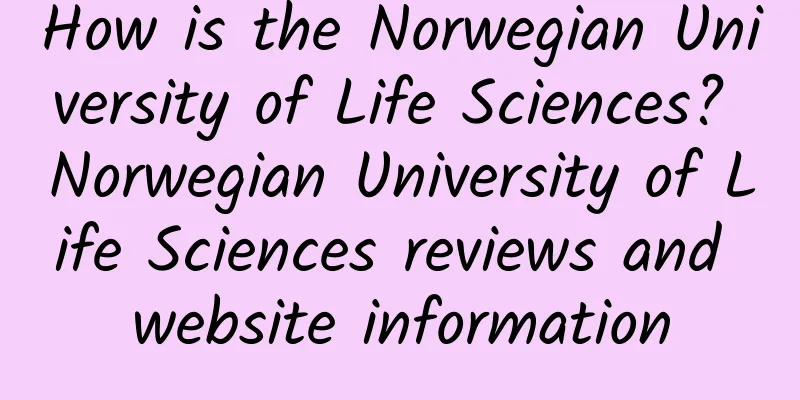How is the Norwegian University of Life Sciences? Norwegian University of Life Sciences reviews and website information

|
What is the website of the Norwegian University of Life Sciences? The Norwegian University of Life Sciences is a public university in Norway. It was founded in 1859 (Norwegian Graduate School of Agriculture) and merged with the Royal Norwegian Veterinary College in 2014 to form the Royal Norwegian University of Environmental Sciences and Life Sciences. Website: www.nmbu.no Norwegian University of Life Sciences: an academic center for exploring nature and lifeOn the Scandinavian Peninsula in Northern Europe, there is a historic and vibrant institution of higher learning - the Norwegian University of Life Sciences (NMBU). As a leader in the field of life sciences in Norway and even in Europe, this university is renowned worldwide for its outstanding research, teaching and innovation. Today, let us take a deeper look at the university's history, disciplinary characteristics and its unique position in global higher education. A long history: from an agricultural college to an internationally renowned universityNMBU's history dates back to 1859, when it was founded as the Norwegian Agricultural Graduate School (Høgskolen i Ås). During this period, Norway was in the early stages of industrialization and the demand for agricultural technology was increasing. Therefore, the school's original mission was to train professionals with modern agricultural knowledge to support national food security and economic development. Over time, the college gradually expanded its research areas to include more life science-related disciplines. By the end of the 20th century, the college had become one of Norway's most important agricultural and environmental science research institutions. In 2014, in order to further enhance its strength and expand its international vision, the college merged with the Royal Norwegian Veterinary School (Veterinærhøyskolen i Oslo) and officially changed its name to the Norwegian University of Life Sciences. This merger not only expanded the scale of the school, but also enabled the school to better integrate resources and promote the development of interdisciplinary research. Today, NMBU has developed into a comprehensive public university with remarkable achievements in many fields. It is not only the core base of life science education in Norway, but also an important participant in global sustainable development research. Academic Strength: Pioneer in Multidisciplinary Life SciencesNMBU is committed to solving major challenges facing humanity, such as climate change, food security, biodiversity conservation, etc. through high-quality education and cutting-edge research. The school has multiple colleges covering a wide range of subject areas, including but not limited to:
It is worth mentioning that NMBU places particular emphasis on interdisciplinary cooperation. For example, in response to climate change, the school brings together ecologists, economists and social scientists to jointly find solutions. This collaborative model makes research results more practical and influential. Campus life: a learning environment where nature and humanity blend togetherNMBU's main campus is located in Ås, a small town in southeastern Norway, about 30 kilometers from the capital Oslo. The beautiful scenery here, surrounded by lush forests and tranquil lakes, provides students with an ideal learning and living environment. At the same time, due to its geographical proximity to Oslo, students can also easily enjoy the conveniences and cultural activities of a big city. The school provides students with a wealth of extracurricular activities, including various clubs, societies and volunteer projects. Whether you are keen on outdoor adventures or want to participate in community service, you can find an opportunity that suits you. In addition, NMBU also pays special attention to students' mental health and well-being, and has set up a dedicated support team to help students cope with study pressure and adapt to the new environment. International Vision: A Bridge Connecting the WorldAs a modern university, NMBU is well aware of the importance of globalization and actively promotes international cooperation and exchanges. The school has established extensive cooperative relations with universities around the world, including many top research institutions and universities. Through exchange student programs, joint research projects and international conferences, NMBU students and faculty are able to be exposed to different cultures and ideas and broaden their horizons. In addition, NMBU actively participates in the EU's Erasmus+ program, encouraging students to study or intern in other countries. These experiences not only help improve students' language skills and professional skills, but also lay a solid foundation for their future career development. Social responsibility: contributing to a sustainable futureAs a responsible university, NMBU has always taken sustainable development as one of its core concepts. The university not only implements this principle in teaching and research, but also practices green commitments through practical actions. For example, NMBU is working hard to reduce carbon emissions, promote renewable energy, and advocate a low-carbon lifestyle. At the same time, NMBU also actively participates in the work related to the United Nations Sustainable Development Goals (SDGs), especially in the fields of eliminating hunger, protecting ecosystems, and promoting gender equality. The school believes that only through the power of education and scientific research can we truly achieve a more equitable and sustainable world. Visit the Norwegian University of Life Sciences websiteIf you are interested in NMBU, you may wish to visit its official website: www.nmbu.no. Here, you can get detailed information about course settings, application procedures, scholarship information and campus life. Whether you want to learn about the latest scientific research trends or want to join this vibrant academic community, the NMBU official website is a stop you cannot miss. Conclusion: Towards a better tomorrowThe Norwegian University of Life Sciences has won wide acclaim for its outstanding academic achievements and firm sense of social responsibility. From an early agricultural college to today's internationally renowned university, NMBU has always adhered to its original intention - to use knowledge and wisdom to improve the quality of human life and protect the earth, our home. For young people who have dreams and aspire to make achievements in the field of life sciences, NMBU is undoubtedly a choice worth considering. Here, you will have the opportunity to explore the unknown, meet challenges with excellent mentors and peers, and contribute to creating a better future. |
Recommend
Can diabetics eat watermelon?
Can diabetics eat watermelon? I believe many diab...
The efficacy and function of hawthorn wine. Who should not drink hawthorn wine?
Hawthorn wine is a ruddy liquid. It is a healthy ...
What is the Howard Hughes Medical Institute like? Howard Hughes Medical Institute reviews and website information
What is the Howard Hughes Medical Institute websit...
How to eat walnut oil
Walnut oil is a very good brain-boosting food. Be...
The efficacy and function of juniper essential oil
People have heard of juniper essential oil, but d...
What are the benefits of drinking orange juice?
Orange juice is a natural juice squeezed from ora...
What is Talanx like? Talanx company reviews and website information
What is Talanx? Talanx is a well-known German list...
How to clean cuttlefish? Methods and skills for cleaning cuttlefish
Cuttlefish tastes very fresh and is rich in nutri...
How to make mushroom porridge
How much do you know about the method of making m...
These five types of people should not eat black rice. Taboos of eating black rice
Everyone is familiar with it and knows that it is...
Is snake skin fruit delicious? How to eat snake skin fruit with pictures
Have you ever eaten snake skin fruit? I have eate...
The efficacy and function of Grifola frondosa
Have you ever seen Grifola frondosa? Do you know ...
How is Air India? Air India reviews and website information
What is Air India? Air India (एअi इंडिय , Air Indi...
Can kiwi peel be eaten? Will kiwi peel cause allergies?
Many people have eaten kiwi fruit and know that i...
How is Brookstone? Brookstone reviews and website information
What is Brookstone? Brookstone is a professional r...









